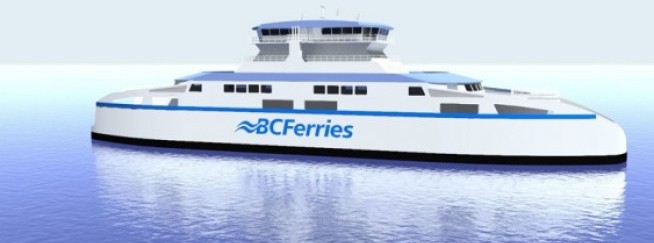Three B.C. Ferries vessels will be built in Poland
Times Colonist
Carla Wilson
July 4, 2014
B.C. Ferries’ three new intermediate-class vessels will be built in Gdansk, Poland, by Remontowa Shipbuilding S.A. for $165 million. A contract was signed Thursday to design, build and deliver the ferries, which will run on liquefied natural gas, with diesel as backup.
“We have every intention to operate fulltime on LNG,” Mark Wilson, B.C. Ferries’ vice-president of engineering, said Thursday.
“These are design-build, fixed-price contracts that provide B.C. Ferries with substantial guarantees related to delivery dates, performance criteria, cost certainty and quality construction,” Wilson said.
Delivery dates are August 2016, October 2016 and February 2017.
The total budget is $252 million. That covers financing and project management, plus $51 million for Canadian taxes and federal import duties, B.C. Ferries said in its announcement.
Companies shortlisted for the job were Remontowa, Fiskerstrand BLRT AS of Norway, Sefine Shipyard of Turkey, Seaspan Vancouver Shipyards of North Vancouver and Flensburger Schiffbau-Gesellschaft of Germany, the company that built the three Coastal ferries for B.C. Ferries. Seaspan withdrew early this year, citing other commitments.
Remontowa was not the lowest bidder and cost was not the only factor, Wilson said. B.C. Ferries staff toured other shortlisted yards, evaluating bids using criteria such as experience building LNG vessels, ability to meet the deadline, overall design, and adherence to the shipbuilding contract.
The intermediate-class ferries will be 344 feet long, have two car decks, hold up to 145 vehicles and 600 passengers, and have food outlets. They will have state-of-the art equipment on the bridge, for lifesaving, and for propulsion, Wilson said.
Two of the new ships will replace the 49-year-old Queen of Burnaby, which runs between Comox and Powell River, and the 50-year-old Queen of Nanaimo, servicing the Southern Gulf Islands-Tsawwassen route. The third vessel will be used in peak and shoulder seasons on the Southern Gulf Islands run and to serve as a relief vessel for the fleet.
Crew size will be reduced by between three and six per vessel. B.C. Ferries will work with its union with the aim of cutting jobs through attrition, Wilson said.
The vessel purchase will be part of an effort to improve efficiency and lower costs by paring the number of ferry classes to five from 17 in the 35-vessel fleet, Wilson said. “Standardization offers greater inter-operability and lower crew training and maintenance costs, and also enhances safety.”
The new ferries will be the first in the fleet to be able to run on LNG and diesel. Currently, LNG is about half the price of diesel and is greener as well, B.C. Ferries said. In the last fiscal year, it spent $126 million on fuel, which represents about 20 per cent of operating costs.
B.C. Ferries is also examining whether it makes sense to convert its two Spirit-class ferries to LNG, he said. Several local companies have expressed interest in supplying LNG, Wilson said.



Site design by Ravensfoot